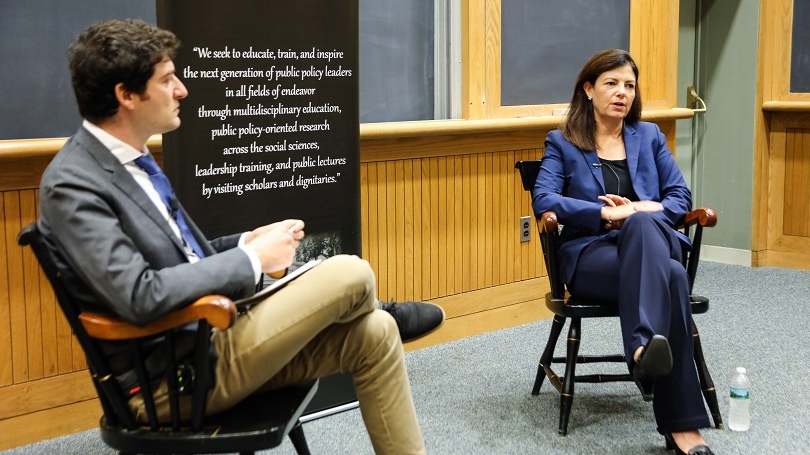
- Public Policy
- Leadership
- Funding
- News & Events
- About the Center
Back to Top Nav
Back to Top Nav
Back to Top Nav
Back to Top Nav
In honor of Constitution Day, the Nelson Rockefeller Center hosted a conversation — touching on federalism and polarization in politics — between former Senator Kelly Ayotte (R-NH) and research assistant professor Dr. Herschel Nachlis. Senator Ayotte is this year’s Perkins Bass Distinguished Visitor, an honor bestowed annually on a New Hampshire citizen who has made or is making an outstanding contribution in the field of government.
During her opening remarks, Ayotte paid homage to her friend and mentor the late Senator John McCain. She lamented the fact that American politics today is “not just in a place where we disagree with people, we have to insult them too,” urging the audience to follow McCain’s example and treat with respect those with whom they disagree. Compromise is both necessary and commendable, she said. Without either, the Constitution would have been impossible; the founders did not agree on everything.
The value of cooperation in politics is something that she grew to appreciate as she transitioned from serving as Attorney General for New Hampshire to representing the state in the United States Senate.
“As an executive, I could say we’re going to treat this case a certain way, and that could happen fairly quickly. As a legislator, you have to have the ability to collaborate, you have to have the ability to ensure you can accomplish something in the collective sense,” she explained in an interview prior to the event. “Because one legislator saying they want to do something does not make it happen.”
Ayotte’s personal experience with public service has also granted her an understanding of the disconnect between American citizens and the federal government.
“When [constituents] do interact with a federal agency, they don’t feel that they get the same customer service that they should,” she explained. “And they look at the acrimony of what happens in Washington, and they think ‘that’s not how I conduct myself in my daily life.’”
While serving as senator, Ayotte saw that her constituents were frustrated with the seeming indifference of the federal bureaucracy, and she grew to be frustrated with it as well. Often, she and her constituents would see “obvious” solutions to problems but were unable to act because of the sheer size of the federal government.
During her talk, she urged Congress to be more judicious in determining which level of government can best respond to a given issue. The more resources the federal government receives, the fewer resources are available for state and local use. Local solutions can be more tailored to local needs, she explained, giving the example of discrepancies between poverty issues in New Hampshire and poverty issues in, say, Alabama.
In response, Professor Nachlis asked Ayotte for her opinion on national injunctions, or rulings in which the court’s decision applies nationwide, not just to the parties directly involved in the case. In keeping with her thesis on federalism, Ayotte responded that though she likes to avoid absolutes, she considers national injunctions to be “undemocratic” and feels that they should be used sparingly.
Professor Nachlis also brought up the timely issue of the hearings for Supreme Court nominee Brett Kavanaugh. Ayotte, who served as the “Sherpa” guide for nominee Neil Gorsuch during his Senate confirmation, said she trusts the hearings will reveal the information necessary to make a careful, informed decision regarding Kavanaugh’s eligibility for the position given the recent sexual assault allegations.
Senator, Attorney General, mother of two—Ayotte has done a lot. Her advice for students interested in following in her footsteps is simple: “Look for opportunities to push yourself and challenge yourself… You need to project to people what you want to do, even if it means taking a risk.”
More broadly, she urged students to find a sense of purpose, asking ‘Why am I here? What do I want to learn?’ and pursuing opportunities that fulfill that purpose.
Written by Eliza Jane Schaeffer ’20, Rockefeller Center Student Program Assistant for Public Programs
The views and opinions expressed, and any materials presented during a public program are the speaker’s own and do not necessarily represent the views and opinions of the Rockefeller Center or constitute an endorsement by the Center.